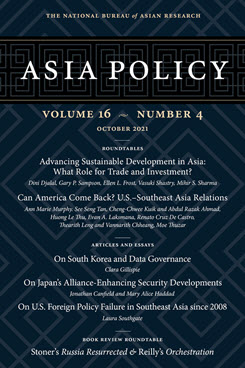Japan’s Alliance-Enhancing Security Developments
This article uses the case of Japanese security policy in the past decade to develop the Alliance-Enhancing Framework, which offers a way to understand the conditions in which security-dependent states can either trigger or escape their alliance dilemma with the U.S.
EXECUTIVE SUMMARY
MAIN ARGUMENT
This article asks a question that is at the core of much of East Asia’s security policy: how can a country that is dependent on the U.S. for its security enhance its policymaking options in ways that will not threaten its U.S. alliance but still provide avenues to develop its own leadership and broader security roles? The alliance dilemma is the possibility, on the one hand, of the weaker state being abandoned by its more powerful partner if it becomes too independent or powerful, among other reasons, and, on the other hand, of entrapment and alliance dependence if the weaker state does not strengthen itself. Through a careful examination of Japan’s recent security policy, we develop the Alliance-Enhancing Framework to understand the conditions under which security-dependent states can transform their asymmetric alliances into ones that are more collaborative, with both sides making meaningful contributions to collective security. The framework reveals that alliance tension can be provoked by certain types of unilateral policy initiatives undertaken by the dependent ally, but that some unilateral, as well as bilateral, actions and regional initiatives generally enhance and improve the partnership.
POLICY IMPLICATIONS
- If smaller allies like Japan pursue unilateral measures that disrupt or undermine their cornerstone alliance, they risk losing their alliance partner and potentially weakening their security standing in the region. However, security reforms that support both the ally’s own national security and the alliance can be successful in knitting the partners closer together.
- Beneficial security initiatives, such as co-development or co-production projects, can bolster a security-dependent ally’s defense posture and simultaneously help transform an asymmetric bilateral alliance relationship into one that is more mutually dependent and reliant on shared capabilities.
- Regional security initiatives linked to the U.S. alliance and its common values confer the biggest advantage for security-dependent countries like Japan. They allow the smaller country to exert geopolitical influence by extending the range and scope of ally-friendly networks alongside the U.S. while also exhibiting leadership and acting more independently.
Jonathan Canfield is a Reischauer Fellow at the Johns Hopkins School of Advanced International Studies (United States). He works on East Asian security policy and U.S.-Japan relations.
Mary Alice Haddad is the John E. Andrus Professor of Government at Wesleyan University (United States). She is author and coeditor of numerous books, including Effective Advocacy: Lessons from East Asia’s Environmentalists (2021) and Building Democracy in Japan (2012). Her research focuses on democracy, civil society, environmental politics, and urban diplomacy in East Asia.
About Asia Policy
Asia Policy is a peer-reviewed scholarly journal presenting policy-relevant academic research on the Asia-Pacific that draws clear and concise conclusions useful to today’s policymakers. Asia Policy is published quarterly in January, April, July, and October and accepts submissions on a rolling basis. Learn more


